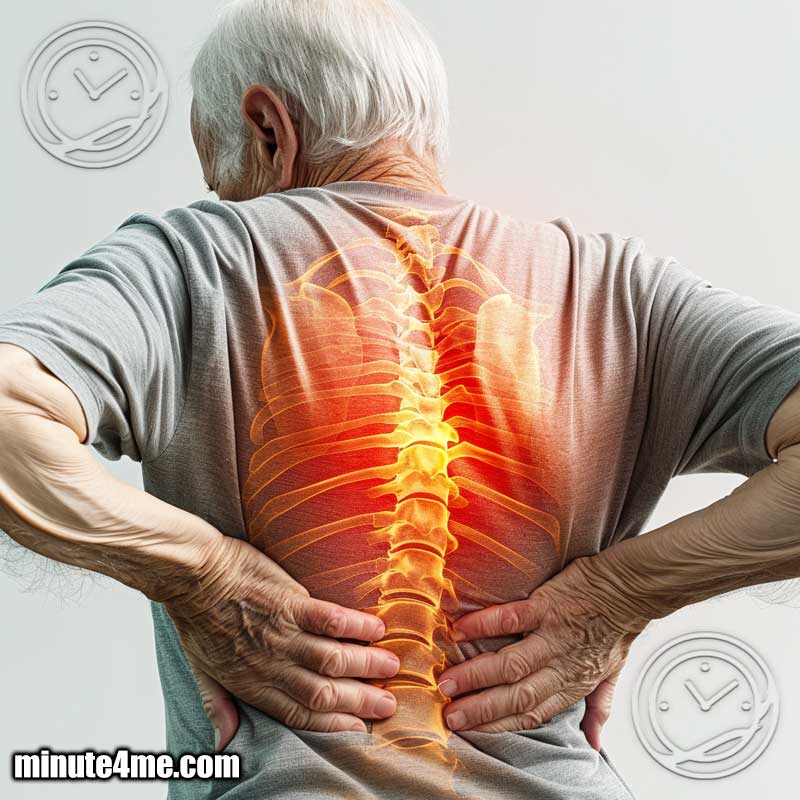Introduction to Bone Health and Diet
The intricate relationship between diet and bone health is pivotal, yet often overlooked.
Nutritional choices directly impact bone density and integrity, setting the stage for how well our skeletal system can support us throughout our lives.
Amidst various dietary patterns, the Mediterranean diet stands out for its potential to bolster bone health and stave off osteoporosis, a condition characterized by weakened bones and heightened fracture risk.
Understanding Osteoporosis and Risk Factors
Osteoporosis, a condition marked by weakened bones and an increased risk of fractures, is a major public health concern affecting millions worldwide.
It is characterized by a reduction in bone mineral density (BMD), which leads to bone fragility.
The risk factors for developing osteoporosis are multifaceted, including:
- Age: Bone density naturally begins to decrease in middle age.
- Gender: Women are more prone to osteoporosis, especially postmenopausal women, due to lower estrogen levels.
- Genetics: A family history of osteoporosis increases risk.
- Lifestyle factors: Physical inactivity, smoking, excessive alcohol consumption, and poor nutrition.
- Dietary factors: Insufficient intake of calcium and vitamin D, high intake of processed foods, red meat, and sugary drinks.
| Risk Factor | Detail | Impact on Bone Health |
|---|---|---|
| Age | Bone density decreases with age | Higher risk of osteoporosis |
| Gender | Women are at higher risk, especially after menopause | Increased bone loss due to lower estrogen levels |
| Genetics | Family history of osteoporosis | Genetic predisposition to lower BMD |
| Lifestyle | Physical inactivity, smoking, excessive alcohol | Contributes to bone density reduction |
| Diet | Low calcium and vitamin D, high processed foods | Directly affects bone metabolism and health |
Preventing osteoporosis involves addressing these risk factors, particularly through dietary and lifestyle modifications.
Heart-Healthy Cooking Techniques
Discover the key to a healthier heart with Minute 4 Me's Heart-Healthy Cooking Techniques. Elevate your culinary skills while safeguarding…
Mediterranean Diet’s Influence on Bone Health
The Mediterranean diet is celebrated for its health benefits, including its positive impact on bone health.
This dietary pattern is associated with slower bone loss and a reduced risk of osteoporosis.
Key aspects of how the Mediterranean diet supports bone health include:
- Nutrient-rich foods: Provides essential nutrients for bone health, such as calcium, vitamin D, magnesium, and potassium.
- Anti-inflammatory properties: Reduces inflammation, which is linked to bone loss.
- Healthy fats: Contains omega-3 fatty acids and monounsaturated fats, like those found in olive oil, which support calcium absorption.
Components and Their Benefits
- Fruits and Vegetables: High in vitamins and minerals essential for bone formation and maintenance.
- Whole Grains: Rich in magnesium, a key mineral for bone health.
- Nuts and Seeds: Sources of healthy fats, calcium, and protein.
- Legumes: Offer protein and micronutrients beneficial for bone structure.
- Fish: Provides omega-3 fatty acids and vitamin D.
- Olive Oil: Main source of healthy fats, promoting calcium absorption and reducing inflammation.
Is Cornbread on the Mediterranean Diet
Uncover the tantalizing debate: Is Cornbread a Mediterranean Diet delight? Delve into the culinary crossroads where tradition meets health. Ana…
Scientific Studies and Evidence
A groundbreaking study led by the University of Bologna highlighted the Mediterranean diet’s efficacy in reducing hip bone loss among osteoporosis patients within just 12 months.
This trial, the first long-term, pan-European clinical study of its kind, involved more than 1,000 participants aged 65 to 79.
It revealed that:
- Participants following the Mediterranean diet experienced significant improvements in femoral neck bone density, unlike the control group, which continued to see the usual age-related decrease.
- The intervention group’s diet was rich in fruits, vegetables, nuts, unrefined cereals, olive oil, and fish, with limited dairy and meat consumption, supplemented by vitamin D to standardize levels across varying sunlight exposures.
| Dietary Component | Effect on Bone Health |
|---|---|
| Fruits & Vegetables | Provide antioxidants and nutrients essential for bone repair and formation. |
| Olive Oil | Reduces inflammation and improves calcium absorption. |
| Fish | Supplies vitamin D and omega-3 fatty acids, crucial for bone density. |
Nutrients That Support Bone Health
The Mediterranean diet’s effectiveness in supporting bone health is largely due to its rich content of specific nutrients crucial for maintaining bone density and preventing osteoporosis:
- Calcium: Vital for bone structure and strength. Predominantly found in leafy greens and dairy products.
- Vitamin D: Essential for calcium absorption. Obtained from fish, eggs, and fortified foods.
- Magnesium and Potassium: These minerals contribute to bone health by supporting bone density. Available in nuts, seeds, whole grains, and vegetables.
- Omega-3 Fatty Acids: Found in fish, these fats are known to reduce inflammation that could otherwise contribute to bone loss.
| Nutrient | Sources in the Mediterranean Diet | Role in Bone Health |
|---|---|---|
| Calcium | Leafy greens, dairy products | Bone structure and strength |
| Vitamin D | Fish, eggs, fortified foods | Enhances calcium absorption |
| Magnesium | Nuts, seeds, whole grains | Supports bone density |
| Potassium | Vegetables, fruits | Contributes to bone strength |
| Omega-3 Fatty Acids | Fish | Reduces inflammation |
Incorporating the Mediterranean diet into daily life provides a comprehensive approach to maintaining bone health and preventing osteoporosis.
Intermittent Fasting and Cardiovascular Health
Discover the transformative power of Intermittent Fasting (IF) for your cardiovascular health journey. Unlike conventional diets, IF offers a flexible…
Calcium and Vitamin D
Calcium and vitamin D are fundamental to bone health, acting as the building blocks for strong, dense bones.
The Mediterranean diet, rich in these nutrients, supports skeletal integrity and reduces the risk of osteoporosis.
- Calcium is crucial for developing and maintaining bone mass. Adults require 1,000 to 1,200 mg of calcium per day, which can be met through the Mediterranean diet’s emphasis on leafy greens, dairy products, and certain fish.
- Vitamin D enhances calcium absorption. The recommended daily intake is 600 to 800 IU, achievable through Mediterranean staples like fatty fish, eggs, and fortified foods, as well as adequate sunlight exposure.
| Nutrient | Daily Requirement | Mediterranean Diet Sources |
|---|---|---|
| Calcium | 1,000-1,200 mg | Leafy greens, dairy, sardines, fortified plant milks |
| Vitamin D | 600-800 IU | Fatty fish (salmon, mackerel), eggs, fortified foods |
Ensuring an adequate intake of these nutrients is key to preventing bone density loss and maintaining structural bone health.
Anti-inflammatory Foods
The Mediterranean diet’s anti-inflammatory effects are beneficial for bone health.
Chronic inflammation can lead to increased bone loss and a higher risk of osteoporosis.
By incorporating anti-inflammatory foods, this diet helps protect against this risk.
- Olive oil, a staple fat source in the Mediterranean diet, contains oleocanthal, which has properties similar to anti-inflammatory drugs.
- Fruits and vegetables are rich in antioxidants and polyphenols, which combat oxidative stress and inflammation.
- Fish provides omega-3 fatty acids, known for their anti-inflammatory effects.
Incorporating these foods into daily meals can significantly reduce inflammation markers and support bone health.
Lifestyle and Bone Health: Beyond Diet
Adopting a Mediterranean lifestyle involves more than just dietary changes; it includes physical activity and moderate alcohol consumption (particularly red wine), which have been shown to complement the diet’s effects on bone health.
- Regular physical activity, especially weight-bearing exercises, strengthens bones and improves balance, reducing the risk of falls and fractures.
- Moderate alcohol consumption, particularly red wine, may offer antioxidant benefits that support bone health, though this should be approached with caution and in moderation.
| Lifestyle Factor | Impact on Bone Health |
|---|---|
| Physical Activity | Increases bone density and reduces fracture risk |
| Moderate Alcohol Consumption | May have antioxidant benefits for bones |
Implementing the Mediterranean Diet for Bone Health
To fully harness the Mediterranean diet for bone health, consider the following practical tips:
- Diversify your intake of fruits and vegetables to ensure a wide range of nutrients.
- Incorporate whole grains at each meal for their magnesium and fiber content.
- Choose lean protein sources like fish and poultry, and include plant-based proteins such as legumes.
- Use olive oil as the main fat source for cooking and dressings.
Meal Planning and Recipes
Meal planning according to the Mediterranean diet principles can be both enjoyable and beneficial for bone health.
Here are some ideas:
- Breakfast: Greek yogurt with fresh fruit and a sprinkle of nuts.
- Lunch: Quinoa salad with mixed greens, cherry tomatoes, cucumber, feta cheese, and a drizzle of olive oil and lemon juice.
- Dinner: Grilled salmon with a side of sautéed spinach and whole grain couscous.
These meal ideas offer a balanced intake of calcium, vitamin D, and anti-inflammatory nutrients vital for bone health.
Challenges and Considerations
While the Mediterranean diet offers numerous health benefits, certain challenges and considerations should be taken into account:
- Individual dietary restrictions or allergies may require adjustments, such as dairy-free sources of calcium for lactose intolerance.
- Accessibility and affordability of fresh produce and seafood can be a barrier in some regions.
| Challenge | Consideration |
|---|---|
| Dietary Restrictions | Seek alternative nutrient sources (e.g., almond milk for calcium) |
| Accessibility | Utilize frozen or canned fruits and vegetables as a viable alternative |
Adapting the Mediterranean diet to fit personal health needs and local availability can help overcome these challenges, ensuring the diet remains a feasible option for supporting bone health.
Conclusion
The Mediterranean diet offers a comprehensive approach to preventing osteoporosis and enhancing bone health through its nutrient-rich, anti-inflammatory dietary pattern.
By adopting this diet, alongside a healthy lifestyle, individuals can significantly impact their bone density and overall well-being, paving the way for a robust and resilient skeletal system in the years to come.







